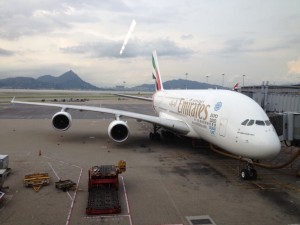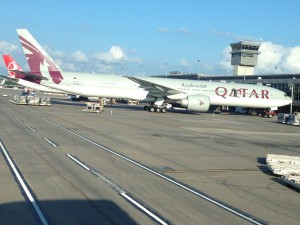United, Delta cut Gulf routes
Only two US based airlines fly to destinations in the Persian Gulf – United and Delta. That already short list now has been reduced to just one with Delta announcing it is ending it’s Atlanta-Dubai (ATL-DXB) route. United also announced it is ending it’s Washington Dulles – Kuwait – Bahrain (IAD-KWI-BAH) route. United now remains the last airline standing with it’s Washington Dulles – Dubai (IAD-DXB) route.
 Delta blames the Gulf based airlines – Emirates, Qatar and Etihad’s – government subsidized operations, and extensive expansion into the US markets as the reason for the pull out. They say the ATL-DXB route has been losing money for two years. Emirates has challenged this claim stating that at the loads at which Delta was operating its plane on the route, it should have been profitable. In fact, they claim to be looking into filling the void left by Delta by adding the Atlanta market.
Delta blames the Gulf based airlines – Emirates, Qatar and Etihad’s – government subsidized operations, and extensive expansion into the US markets as the reason for the pull out. They say the ATL-DXB route has been losing money for two years. Emirates has challenged this claim stating that at the loads at which Delta was operating its plane on the route, it should have been profitable. In fact, they claim to be looking into filling the void left by Delta by adding the Atlanta market.
All this is in the backdrop of the charge made by Delta, United and American that the Gulf bases airlines would be restricted from adding flights to the US as they are government subsidized, and hence have an unfair advantage. The Gulf based airlines deny the claim, and intact claim that the US based airlines, which have all gone thru bankruptcies and mergers are the ones with an unfair advantage.
Personally I have no idea who is right, but the product offered by the Gulf airlines is definitely superior to that of the US based airlines. Given my loyalty to United’s MileagePlus program, I want United to succeed, deliver a better product, and add new routes. Or, the Gulf based airlines join an alliance to add opportunities to earn miles and status b flying them. Not going to happen. Maybe this competition is exactly what the US based airlines need to be pushed into taking hard look at their expense loads and product quality.
What do you think? Should the US government ‘protect’ the US carriers? Or have market forces play the course and let the passengers pick winners and losers with their feet and wallets? Leave a comment below.

No, the legacy carriers all get major subsidies, tax breaks, government taking over their pension obligations Etc.
They are hypocrites. Delta just bought $450 million in China Eastern stock and it is in their financial reporting that they are the most government subsidized airline in China. Sky Team has Altalia, controlled by Ethiad, and so on.
Let them try competing instead of complaining.
“[T]he product offered by the Gulf airlines is definitely superior to that of the US based airlines.”
Emirates has angled seats in business class on everything but its A380s and has 10 across in economy on its 777s. United is 100% lay flat on its long haul business class and Delta is close to 100%. Plus both United and Delta are only 9 across on their 777s. Not sure how this myth persists that the gulf carriers are so much nicer than the US based airlines. In first class, maybe, but not on the rest of the plane unless you’re on an A380.
The question is not whether the U.S. government is “protecting” U.S. carriers. It is whether or not, according to the terms of the Open Skies agreements that were signed between the Middle Eastern countries involved and the U.S. — if those countries are operating within the restrictions that are contained in these agreements. Or not.
It would be better if everyone stripped out the emotion of this argument and looked at it for what it is — the U.S. carriers want the U.S. government to open up consultations on these particular agreements. Period.
Meanwhile, if a U.S. carrier cannot make a flight to the Middle East work, and they can make more money using the aircraft elsewhere, that is a wise commercial decision. Route changes are made on an almost weekly basis. For any number of reasons.
As for the comment about how the product of the U.S. carriers does not stack up to that of the Middle Eastern carriers, I would suggest that that’s what happens when a publicly traded company in the U.S. has an obligation to shareholders to operate profitably — as opposed to when an airline is given almost an unlimited amount of funds and other support to operate with — being a part of a much larger economic development strategy set up by the government where the airline is based.
Both are defendable positions. Just very different business models.
Two very DIFFERENT business models.